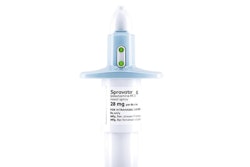WASHINGTON (AP) — A bill helping people with deadly diseases try experimental treatments sailed through Congress on Tuesday, a victory for President Donald Trump and foes of regulation and a defeat for patients' groups and Democrats who argued the measure was dangerous and dangled false hope.
After an emotional debate, the House gave the legislation final congressional approval by a largely party-line vote of 250-169, nine months after it passed the Senate.
Republicans argued that the measure would help hundreds of thousands of people, patients "desperately seeking a beacon of hope," said House Energy and Commerce Chairman Greg Walden, R-Ore.
"Why do you not want to allow these patients to exercise their right to fight for their future?" Rep. Michael Burgess, R-Texas, who chairs that panel's health subcommittee, asked Democrats.
Rep. Frank Pallone of New Jersey, top Democrat on the committee, had an answer. The measure would give people diagnosed with life-threatening conditions and who've exhausted treatment options access to unproven drugs without first getting a sign off from the federal Food and Drug Administration, an omission Pallone said was dangerous.
"This will provide fly-by-night physicians and clinics the opportunity to peddle false hope and ineffective drugs to desperate patients," Pallone said.
The bill "puts patients at risk by allowing the sale of snake oil," said Rep. Jan Schakowsky, D-Ill.
Trump endorsed the effort in January's State of the Union address, saying, "People who are terminally ill should not have to go from country to country to seek a cure — I want to give them a chance right here at home."
The so-called Right to Try legislation has been pushed by the libertarian Goldwater Institute, which broadly backs decreased government regulation and has helped get similar bills enacted in over three dozen states. It is also supported by the conservative Americans for Prosperity, backed by the wealthy brothers Charles and David Koch, which warned it would include the vote in its annual rating of lawmakers' records.
New drugs normally undergo years of expensive testing before manufacturers seek and gain FDA approval to market them.
The bill, originally sponsored by Sen. Ron Johnson, R-Wis., also provides some legal protections for pharmaceutical makers, doctors or others involved in providing the treatment.
Critics say the legislation leaves the incorrect impression that the FDA is the bottleneck that deprives dying patients of unproven options.
FDA figures show it already approves 99 percent of the roughly 1,000 requests it receives from doctors annually for so-called "compassionate use" of such treatments. The process generally takes about four days, though permission can be granted immediately by phone in emergencies.
The biggest hurdle would remain a reluctance by manufacturers to provide unapproved products. Companies might not have enough of the medication to spare to supply it to patients or want to avoid liability if problems arise. The bill does not require pharmaceutical firms to provide their experimental drugs to patients.
Critics say the measure is weaker than an earlier version the House approved in March. It requires providers to give the FDA annual summaries of experimental drugs they've provided, rather than reporting within seven days of giving a product to a patient. And unlike the initial bill, the approved legislation doesn't require doctors to immediately report problems to the manufacturer.
Last October, FDA Commissioner Scott Gottlieb told lawmakers that "the vast majority" of people using unproven medications "are using a drug that doesn't work."
Gottlieb, a Trump appointee, tweeted this week that he is "comfortable with both versions of the legislation."
Groups representing patients and research groups opposed the initial House bill as unsafe. In a letter Tuesday over 100 of them said the final legislation is worse.
The groups, which included the American Cancer Society Cancer Action Network, wrote that because of its narrower protections, the final measure "could greatly increase the likelihood of our patients being harmed by unsafe and ineffective experimental therapies." The pro-consumer Public Citizen wrote that the final legislation "would pose far greater danger to the health and welfare of patients" than the initial package.
In March, the House approved its own bill with stronger patient protections. That measure died in the Senate after Minority Leader Chuck Schumer, D-N.Y., blocked it in hopes of forcing even tougher provisions.






















